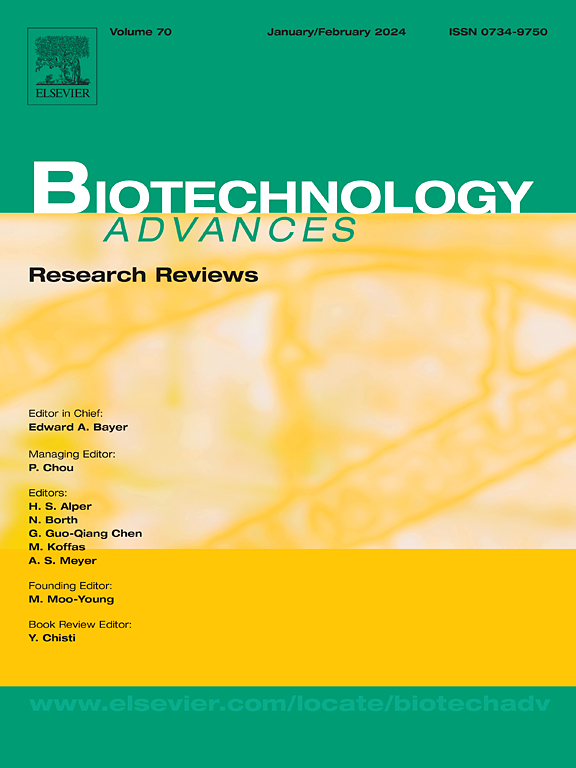Microalgal bioengineering for futuristic applications in synthetic and space biology
IF 12.5
1区 工程技术
Q1 BIOTECHNOLOGY & APPLIED MICROBIOLOGY
引用次数: 0
Abstract
Extreme environmental conditions on Earth and in space pose significant challenges to sustaining life. As global population growth exacerbates issues such as climate change, food security, and resource depletion, innovative solutions are needed. Similarly, confined and isolated environments on Earth and in space lack essential life-supporting resources such as oxygen, water, and food. Combined with the challenges of microgravity and radiation exposure, these factors present substantial obstacles to advancing human space exploration. Biotechnological innovations are essential to enable long-term habitation in extraterrestrial environments. Microalgae, with their high photosynthetic efficiency, diverse metabolic capabilities, omnipresence in the natural world, and adaptability to extreme conditions, have emerged as promising candidates for synthetic biology (SynBio) applications. Recent advancements in genetic engineering, particularly CRISPR-based genome editing (GE), provide unprecedented opportunities to enhance microalgal traits for the sustainable bioproduction of oxygen, water, and nutrition in space missions. Engineered microalgae hold immense potential for bioregenerative life support systems (BLSS), supplying essential resources while reducing logistical constraints. This review examines the integration of SynBio and GE in microalgae, highlighting their role in space research and environmental sustainability. We discuss key advancements in CRISPR and innovative (omics, synthetic gene circuits, artificial cells, nanotechnology, and artificial intelligence) technologies relevant to metabolic pathway engineering and space-adapted microalgal systems, underscoring their transformative potential in addressing both terrestrial and extraterrestrial challenges.

微藻生物工程在合成生物学和空间生物学中的未来应用
地球和太空的极端环境条件对维持生命构成了重大挑战。随着全球人口增长加剧了气候变化、粮食安全和资源枯竭等问题,需要创新的解决方案。同样,地球和太空中密闭和孤立的环境缺乏氧气、水和食物等基本的生命维持资源。再加上微重力和辐射的挑战,这些因素对推进人类空间探索构成了重大障碍。生物技术创新对于在地外环境中长期居住至关重要。微藻以其高光合效率、多种代谢能力、在自然界无所不在以及对极端条件的适应性等优点,成为合成生物学(SynBio)领域的潜在应用对象。基因工程的最新进展,特别是基于crispr的基因组编辑(GE),为在太空任务中可持续地生产氧气、水和营养提供了增强微藻特性的前所未有的机会。工程微藻在生物再生生命支持系统(BLSS)方面具有巨大的潜力,在提供必要资源的同时减少了后勤限制。本文综述了合成生物和基因工程在微藻中的应用,重点介绍了它们在空间研究和环境可持续性方面的作用。我们讨论了与代谢途径工程和空间适应微藻系统相关的CRISPR和创新(组学、合成基因电路、人工细胞、纳米技术和人工智能)技术的关键进展,强调了它们在解决地球和外星挑战方面的变革潜力。
本文章由计算机程序翻译,如有差异,请以英文原文为准。
求助全文
约1分钟内获得全文
求助全文
来源期刊

Biotechnology advances
工程技术-生物工程与应用微生物
CiteScore
25.50
自引率
2.50%
发文量
167
审稿时长
37 days
期刊介绍:
Biotechnology Advances is a comprehensive review journal that covers all aspects of the multidisciplinary field of biotechnology. The journal focuses on biotechnology principles and their applications in various industries, agriculture, medicine, environmental concerns, and regulatory issues. It publishes authoritative articles that highlight current developments and future trends in the field of biotechnology. The journal invites submissions of manuscripts that are relevant and appropriate. It targets a wide audience, including scientists, engineers, students, instructors, researchers, practitioners, managers, governments, and other stakeholders in the field. Additionally, special issues are published based on selected presentations from recent relevant conferences in collaboration with the organizations hosting those conferences.
 求助内容:
求助内容: 应助结果提醒方式:
应助结果提醒方式:


